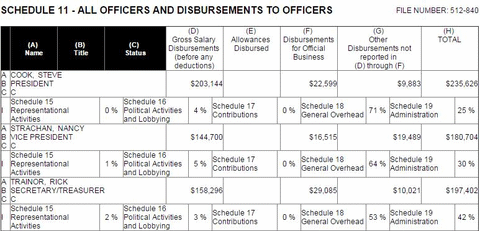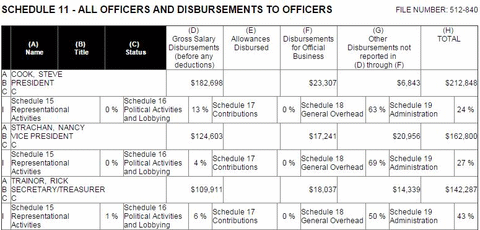MEA Gives False Explanation to Members About Why Executive Salaries Rose
In response to a Michigan Capitol Confidential article about higher compensation for union executives, the Michigan Education Association sent a letter justifying the salary increases by making false claims to local leaders.
The memo, which was sent Dec. 2 to all local presidents and is reprinted on the union’s Facebook page, says:
Yesterday we filed our annual LM-2 filing with the US Department of Labor. The Mackinac Center is reporting ‘huge’ pay increases for MEA Executives. As some of you know, the LM-2 lists every person to whom MEA has written a check to over the past year – for example, if you’ve received a reimbursement check you are listed in the LM-2. The issue with the LM-2 though is they list everything as income. So for the officers in addition to salary, the auto allowance, expense account and any reimbursement is also considered ‘income’ in the LM-2.
But according to the federal Department of Labor the MEA is incorrect.
As reported previously by Michigan Capitol Confidential, “While some of its dues-paying members are taking pay freezes, top executives of the Michigan Education Association took salary raises ranging from $13,591 to as high as $48,385 in 2014, according to the financial reports the union recently filed with the U.S. Department of Labor.”
MEA president Steve Cook’s response that the LM-2 considers “everything as income” and counts “any reimbursement” as salary is false.
On the LM-2, a federal form required yearly by the government, the compensation of labor executives is spelled out. The main categories making up total compensation are “gross salary,” “allowances,” “disbursements for official business” and “other disbursements not reported" (see below).
Ian Burg, the district director covering Michigan for the U.S. Department of Labor, cited instructions for how unions deal with payments to or on behalf of officers. Burg confirmed that the reimbursements mentioned in the MEA's letter would fall under categories other than salary.
"[O]ther than the exceptions noted in the instructions, anything other than salary/wages/lost time/etc. would be reported in either Columns (E), (F), or (G) depending on the nature of the disbursement," Burg said.
A second Department of Labor employee, James Haskins, who is Chief Branch of Audits, agreed.
"The correct interpretation is that generally most 'auto allowances and other reimbursements' would fall in Columns (E), (F), or (G)," Haskins said.
According to the Department of Labor, “gross salary” (column “D” on the form) – which is the increase discussed in the Michigan Capitol Confidential article and a follow-up from the Detroit Free Press – does not include other reimbursements. Other allowances besides salary are included in separate columns (“E” and “F” on the form). The explanation from the department of labor for column F reads, “Enter all direct and indirect disbursements to each officer that were necessary for conducting official business of the labor organization, except salaries or allowances which must be reported in Columns (D) and (E), respectively.”
In its forms, the MEA did fill out expenses under column F. But those were not included when reporting the salary increases for the union executives.
The union letter also took issue with Secretary/Treasurer Rick Trainor receiving a 44 percent increase in salary according to the reports they filed. The MEA said this is a “billing issue” with his employing district. When asked about this salary increase from Michigan Capitol Confidential and the Detroit Free Press, the union declined to offer any explanation.
MEA communications director Nancy Knight did not immediately respond to a request for comment about the letter.
Here is how the compensation form for MEA executives on the LM-2 looks for the past two years (click to enlarge):
2014:
2013:
Michigan Capitol Confidential is the news source produced by the Mackinac Center for Public Policy. Michigan Capitol Confidential reports with a free-market news perspective.




 Michigan Education Association’s power is on a long decline
Michigan Education Association’s power is on a long decline
 MEA head boasts of membership growth, but numbers tell a different story
MEA head boasts of membership growth, but numbers tell a different story
 Michigan Education Association is down 37,000 members in a decade
Michigan Education Association is down 37,000 members in a decade